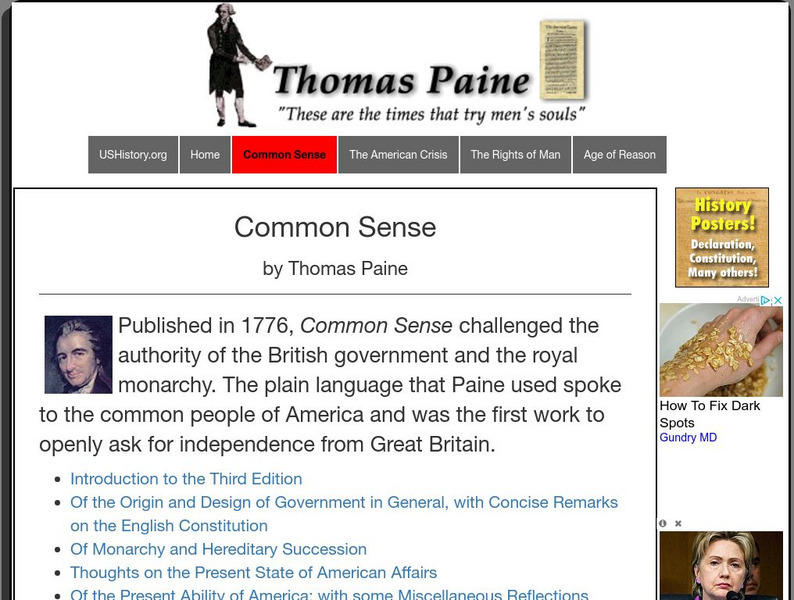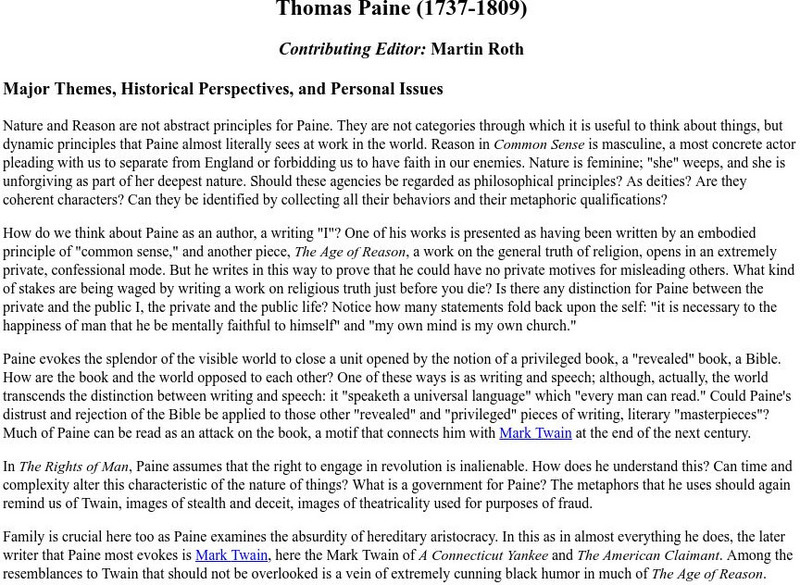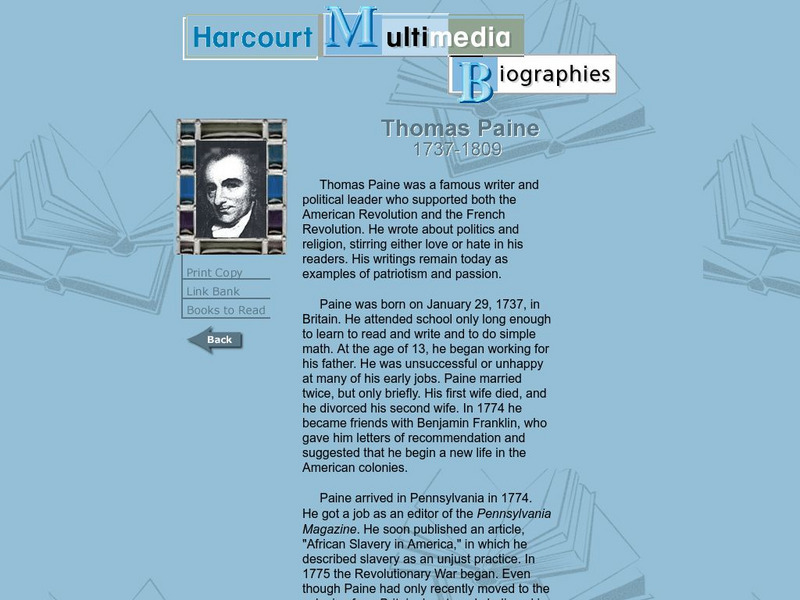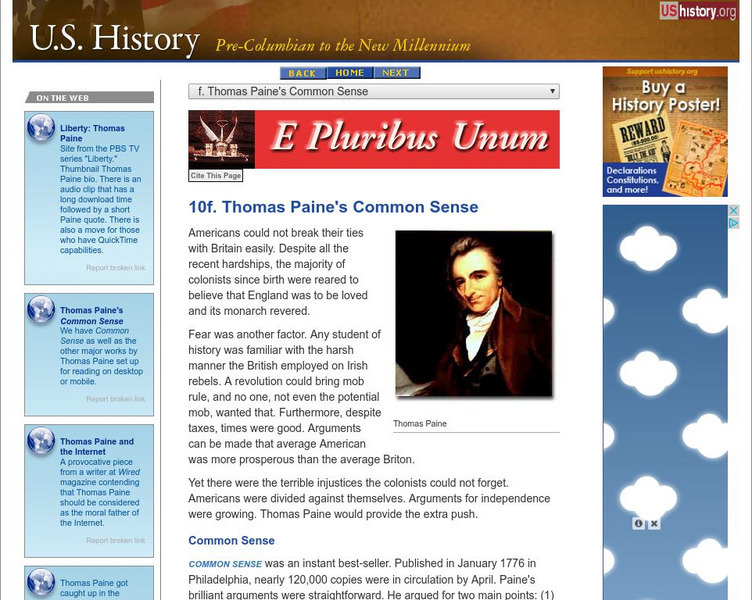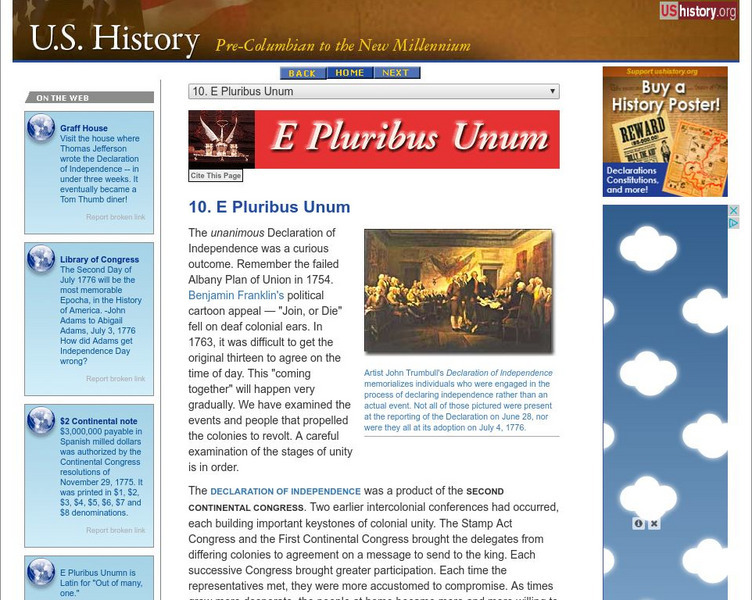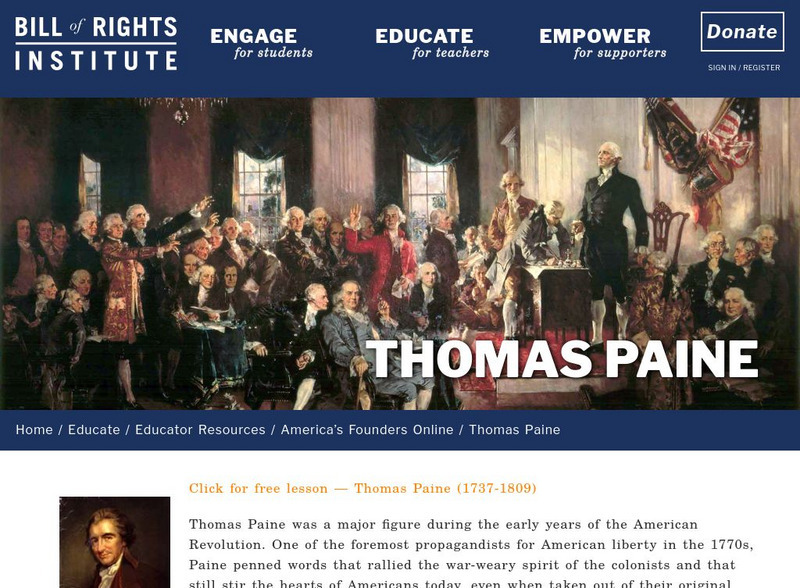Other
Positive Atheism: Life of Thomas Paine
This site features the complete text of Thomas Clio Rickman's 1819 biography of the chief political philosopher of the American Revolutionary War.
National Humanities Center
National Humanities Center: America in Class: Thomas Paine's Common Sense, 1776
Lesson on how Thomas Paine's pamphlet Common Sense convinced reluctant Americans to abandon the goal of reconciliation with Britain and accept independence as the only option for preserving their liberty.
OpenStax
Open Stax: 1775 1783: Britain's Law and Order Strategy and Its Consequences
This section of a chapter on "America's War for Independence" deals with Great Britain's response to the destruction of a British shipment of tea in Boston Harbor in 1773 and how it set the stage for the Revolution.
Huntington Library
Huntington Library: A Nation Conceived in Liberty [Pdf]
In this instructional activity, 11th graders examine the events and political philosophy that laid the foundations of the American government, the Constitution, and the Bill of Rights. They also look at what role religion played in...
Independence Hall Association
U.s. History: Common Sense by Thomas Paine
The complete original text of the third edition of Thomas Paine's "Common Sense" published in 1776 in six linked sections.
PBS
Pbs Learning Media: Thomas Paine: Writer and Revolutionary
By watching a biographical video and engaging in two primary source activities, students will encounter the ideas, writings, and impact of Thomas Paine.
Cengage Learning
Paine/common Sense
This site takes a brief look into Thomas Paine (1737-1809). The site includes Paine's thoughts and beliefs as well as providing an analysis of his writings.
University of Groningen
American History: Outlines: The Political Pamphlet: Thomas Paine (1737 1809)
The passion of Revolutionary literature is found in pamphlets, the most popular form of political literature of the day. Over 2,000 pamphlets were published during the Revolution. The pamphlets thrilled patriots and threatened loyalists;...
University of Groningen
American History: Outlines: Common Sense and Independence
Overview of the philosophy of Thomas Paine in his widely read Common Sense pamphlet, and "natural rights" philosphy as expressed in the opening passage of the Declaration of Independence.
Steven Kreis, PhD
The History Guide: Thomas Paine, 1737 1809
An in-depth profile of Thomas Paine and discussion of his literary works. Includes links to e-texts of his writings.
PBS
Pbs Liberty!: Thomas Paine
Short biography of Revolutionary activist Thomas Paine. Includes historical illustration of Paine plus a video clip from the PBS documentary "Liberty."
Other
Common Sense Complete Text
Text of Thomas Paine's "Common Sense." Click onto introduction for full text or if you are looking for a specific section, then click onto the heading.
Other
Biographies: Thomas Paine
Detailed biography of the American revolutionary writer and thinker Thomas Paine. Includes discussion of the influence of his writing on international affairs.
Other
Media Vision Voices: Meet Thomas Paine
Read an extensive biography of 18th century political writer Thomas Paine, click to read about his ideas placed in a contemporary context, and use research links to read more online.
Houghton Mifflin Harcourt
Harcourt: Biographies: Thomas Paine
Brief biography regarding Revolutionary War writer Thomas Paine.
Other
Book Review: Becoming America:the Revolution Before 1776
A detailed review by James T. Kloppenberg, constructively criticizing the author's (Jon Butler) thesis that ties between colonial religion and politics are exaggerated.
C-SPAN
C Span American Writers: Thomas Paine
Read about Thomas Paine's revolutionary publication "Common Sense" of 1776. Be sure to click on 'featured place' and 'classroom resources' for more facts and information about Paine.
C-SPAN
American Writers: Thomas Paine
An informational site on Thomas Paine. Includes general information about his life, works, and writings, including Common Sense and The Age of Reason. Also includes links to other sites.
Independence Hall Association
U.s. History: Loyalists, Fence Sitters, and Patriots
Read about the war of propaganda the Patriots needed to wage in order to persuade the vast majority of Americans, who were at first ambivalent to the cause of independence, to support the ideals of the Revolutionary War.
Independence Hall Association
U.s. History: Thomas Paine's Common Sense
Read about the rhetorical touches Thomas Paine employed in his pamphlet, Common Sense, which galvanized colonial thought about actually breaking away from Mother England.
Independence Hall Association
U.s. History: E Pluribus Unum
The fact that the Second Continental Congress convened was evidence that the colonists had had enough from the British Parliament. Read about the ways the colonies finally began to work together and focus on a common plan, resulting in...
Bill of Rights Institute
Bill of Rights Institute: Thomas Paine
Thomas Paine was a major figure during the early years of the American Revolution. One of the foremost propagandists for American liberty in the 1770s, Paine penned words that rallied the war-weary spirit of the colonists and that still...
Varsity Tutors
Varsity Tutors: Archiving Early America: A Loyalist Answers Thomas Paine
Loyalist James Chalmers answers Thomas Paine's Common Sense.
BBC
Bbc History: Thomas Paine
Professor John Belchem, of the University of Liverpool, writes this scholarly profile of Thomas Paine for BBC History. In it he describes the tenor and impact of Paine's writings and explains the significance of Paine's thinking on the...



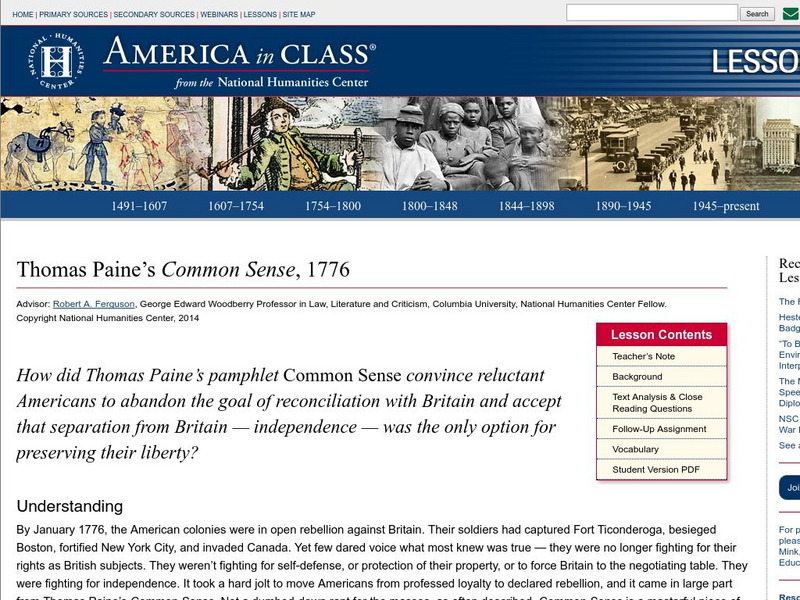

![Huntington Library: A Nation Conceived in Liberty [Pdf] Lesson Plan Huntington Library: A Nation Conceived in Liberty [Pdf] Lesson Plan](https://d15y2dacu3jp90.cloudfront.net/images/attachment_defaults/resource/large/FPO-knovation.png)
